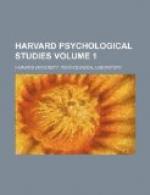Before passing to the experiments in which the open spaces were presented first, I wish to offer an explanation for the divergent tendencies that were exhibited through all the experiments of the last two sections, namely, that the short filled spaces are overestimated and the long spaces underestimated. Let us take two typical judgments, one in which a filled space of 3 cm. is judged equal to an open space of 4.2 cm., and then one in which the filled space is 9 cm., and is judged equal to an open space of 7.4 cm. In the case of the shorter distance, because of its shortness, after the finger leaves it, it is held in a present state of consciousness for some moments, and does not suffer the foreshortening that comes from pastness. This is, however, only a part of the reason for its overestimation. After the finger-tip has left the filled space, and while it is traversing the first part of the open space, there is a dearth of sensations. The tactual sensations are meager and faint, and muscular tensions have not yet had time to arise. It is not until the finger has passed over several centimeters of the distance, that the surprise of its barrenness sets up the organic sensations of muscular strain. One subject remarked naively at the end of some experiments of this kind, that the process of judging was an easy and comfortable affair so long as he was passing over the filled space, but when he set out upon the open space he had to pay far more strict attention to the experiment.
By a careful introspection of the processes in my own case, I came to the conclusion that it is certainly a combination of these two illusions that causes the overestimation of the short filled distances. In the case of the long distances, the underestimation of the filled space is, I think, again due to a combination of two illusions. When the finger-tip leaves the filled space, part of it, because of its length, has already, as it were, left the specious present, and has suffered the foreshortening effect of being relegated to the past. And, on the other hand, after the short distance of the open space has been traversed the sensations of muscular strain become very pronounced, and cause a premature judgment of equality.
One subject, who was very accurate in his judgments, and for whom the illusion hardly existed, said, when asked to explain his method of judging, that after leaving the filled space he exerted a little more pressure with his finger as he passed over the open space, so as to get the same quantity of tactual sensations in both instances. The muscular tension that was set up when the subject had passed out over the open space a short way was very plainly noticeable in some subjects, who were seen at this time to hold their breath.




